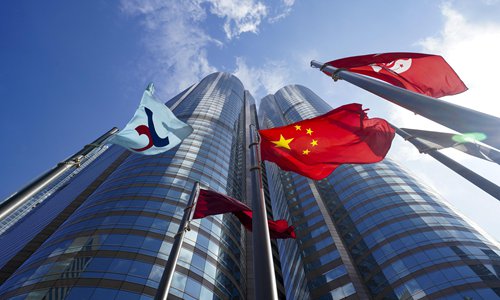Hong Kong stock market adds tech index as mainland high-tech companies influx
Source: Global Times Published: 2020/7/20 22:13:40

The Hong Kong Stock Exchange building on July 11 Photo: VCG
Hong Kong's leading stock index complier Hang Seng Indexes Co. said on Monday that it would launch a new benchmark index that will track key technology players in Hong Kong, as more mainland tech firms seek to be listed in the city amid intensifying tension between China and the US in the technology and financial sectors.
The Hang Seng TECH Index, which is set to debut on July 27, will track the 30 largest technology companies listed in the Hong Kong Stock Exchange, Hang Seng said in a statement. Among the top players are Alibaba, Tencent, Meituan and Xiaomi, which together will have a weighting of over 33 percent.
"In view of the rapid blossoming of new businesses in the technology sector and the increasing number of technology companies that are listed in Hong Kong, we developed the Hang Seng TECH Index to meet the fast-growing interest on this investment theme among investors," Anita Mo, Hang Seng CEO, said in the statement.
Hong Kong has seen a rising number of listings by mainland tech companies, including those listed in the US, as US officials are stepping up crackdowns on Chinese tech companies. Alibaba, NetEase and JD.com have all held secondary listings in the city in recent months. Also on Monday, fintech firm Ant Group, which is an affiliate of Alibaba, said that it would list shares in both Shanghai and Hong Kong.
"I think it is only logical [to have a tech index] given that many new IPOs are issued by technology companies from the mainland and they have been performing very well," Francis T. Lui, professor emeritus of the Hong Kong University of Science and Technology, told the Global Times on Monday, adding that the new index will provide "good options" for investors.
The new Hang Seng TECH Index also aims to facilitate the development of various index-linked products, including funds and derivatives, Mo said in the statement, which suggests the index would have achieved returns of 36.2 percent for 2019 and 35.3 percent in the first half of 2020.
The move on Monday also came as some foreign officials and media outlets have been pushing what Chinese analysts call fear-mongering narratives over the implementation of the National Security Law for Hong Kong, with some even pronouncing the death of Hong Kong's status as a global financial hub.
"That kind of talk is nonsense," Lui said, in rebut of reports of foreign capital fleeing Hong Kong adding that Hong Kong's financial sector has been stable.
RELATED ARTICLES:
Posted in: MARKETS